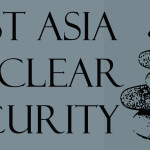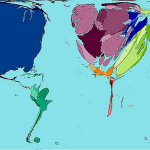- DETERRENCE: The great strategic triangle
- DPRK: U.S. tells China its growing Asia Pacific military force is ‘stabilizing’
- ENERGY SECURITY: Europe is becoming a green-energy basket case
- GOVERNANCE AND CIVIL SOCIETY: N. Korea accepts China’s offer for dialogue: Japanese newspaper
- CLIMATE CHANGE ADAPTATION: Enhancing the resilience of seaports to a changing climate
- CLIMATE CHANGE AND SECURITY: Redirect military expenditure to ensure a sustainable future
 DETERRENCE: The great strategic triangle, Alexei Arbatov and Vladimir Dvorkin, Carnegie Endowment for International Peace (April 2013) [PDF, 2.6MB]
DETERRENCE: The great strategic triangle, Alexei Arbatov and Vladimir Dvorkin, Carnegie Endowment for International Peace (April 2013) [PDF, 2.6MB]
China’s nuclear forces may be unable to retaliate and are likely preemptively oriented. Its 2nd-strike capability is only viable if it has hidden missile reserves. Limits on intermediate range forces, US-China-Russian BMD sharing, and a missile launch Asia-Pacific Joint Data Exchange Center might stabilize the triangle.
- Debating China’s no-first-use commitment: James Acton responds, Proliferation Analysis (22 April 2013)
- China will not change its nuclear policy, Yao Yunzhu, Director, China-America Defense Relations, Academy of Military Science, China US Focus (22 April 2013)
- The diversified employment of China’s armed forces, Information Office of the State Council, Xinhua (16 April 2013)
DPRK: U.S. tells China its growing Asia Pacific military force is ‘stabilizing’, PressTV (23 April 2013)
U.S. and Chinese senior leaders met, exchanged positions and are likely de-conflicting strategies after the Secretary of State and China’s President met earlier this month. The Senior U.S. military officer, the Chairman of the Joint Chiefs of Staff was hosted by his Chinese counterpart. China’s lead negotiator for the Six Party Talks was in D.C. at the same time underscoring the degree to which North Korea has pushed the two countries together.
- China’s special representative for Korean Peninsula affairs Wu Dawei calls on Washington, Li Boya, Chinese People’s Daily Online (23 April 2013) [Chinese Language]
- U.S. to press China over repatriation of NKoreans, Matthew Pennington, Associated Press (28 April 2011)
- South Korea’s Park plans visit to China in May, United Press International (20 April 2013)
ENERGY SECURITY: Europe is becoming a green-energy basket case, Editorial Board, Washington Post (21 April 2013)
It’s the Earth Day 2013, with yet another round of beating breasts while taking a beating. Is it the beginning of the end for the renewables industry and carbon permit scheme in Europe, and are the lights going to go out, or is it the end of the beginning phase and renewables will be born again with new gusto and feverish fervour? For power-short counties, grid-PV is in principle a viable alternative on a large scale, but is that also fraught with risks not yet encountered – trade restrictions, corruption, limited institutional capacity to plan, budget and execute?
- Renewables industry calls for ‘hat-trick’ of 2030 targets to spur growth, Arthur Neslen, Euractiv (18 April 2013)
- Fossil fuel power sources cost more than renewables in Germany, Zoë Casey, EWEA (4 April 2013)
- India plans subsidies to boost solar-power sector, Megha Bahree, The Wall Street Journal (21 April 2013)
GOVERNANCE AND CIVIL SOCIETY: N. Korea accepts China’s offer for dialogue: Japanese newspaper, Yonhap News (20 April 2013)
The DPRK has indicated its willingness to meet with senior Chinese officials to discuss easing tensions in the region, although it has rejected dialogue with the US. While tensions appear to ease with the DPRK, they are rising between China, the ROK and Japan over a visit by a record number of Japanese lawmakers to Yasukuni Shrine, resulting in the cancellation of a trip by the ROK Foreign Minister, and continued tensions over the Senkakus/Diaoyu.
- South Korea minister cancels Japan visit over war shrine, Ju-min Park, Reuters (22 April 2013)
- US looks to ease Japan-S. Korea teansions, Scott Stearns, Voice of America (23 April 2013)
- Japan PM Abe warns China of force over islands landing, BBC (23 April 2013)
CLIMATE CHANGE ADAPTATION: Enhancing the resilience of seaports to a changing climate: research synthesis and implications for policy and practice, Darryn McEvoy and Jane Mullett, RMIT University and NCCARF, Australia (2013)
Acting on future climate risks to seaports, particularly bridging the divide between the climate science and adaptation action, is a challenging endeavour. It involves matching output from the evolving climate models with the information needs of different port ‘end users’ in order to consider elements at risk at the local scale. As such, a hybrid approach involving multi-actor dialogue – in support of co-generation of knowledge – is necessary to underpin an effective assessment process.
- Understanding future risks to ports in Australia, Report series: enhancing the resilience of seaports to a changing climate, Darryn McEvoy, Jane Mullett, Sophie Millin, Helen Scott, Alexei Trundle, RMIT University and NCCARF, Australia (2013) [5.30 MB, PDF]
- Structural resilience of core port infrastructure in a changing climate, Report series: Enhancing the resilience of seaports to a changing climate, Daniel Kong et al., RMIT University and NCCARF, Australia (2013) [5.30 MB, PDF]
 CLIMATE CHANGE AND SECURITY: Redirect military expenditure to ensure a sustainable future, Kumi Naidoo, Guardian Sustainable Business Blog (17 April 2013)
CLIMATE CHANGE AND SECURITY: Redirect military expenditure to ensure a sustainable future, Kumi Naidoo, Guardian Sustainable Business Blog (17 April 2013)
Last year $1.75tn was spent on the world’s military. People are entitled to question whether this is money well spent to ensure security. Climate change and a carbon-intensive economy are already responsible for 5 million deaths each year. More than $3.5tn is spent annually on the world’s military and on subsidising fossil fuels. We can no longer allow governments to spend recklessly on the wrong things, when so many right things remain neglected.
- Kiribati holds national hearings on climate change, Australian Network News (19 April 2013)
- The United States and China to increase dialogue on climate change, Natural Security Blog, Center for a New American Security (13 April 2013)
- Brazil soya and beef exports driving 30% of deforestation emissions, Ed King, Responding to Climate Change (19 April 2013)
The Nautilus Peace and Security Weekly Report presents articles and full length reports each week in six categories: Austral security, nuclear deterrence, energy security, climate change and security, the DPRK, climate change adaptation and governance and civil society. Our team of contributors carefully select items that highlight the links between these themes and the three regions in which our offices are found—North America, Northeast Asia, and the Austral-Asia region.
Subscribe to NAPSNet to receive free weekly email reports
Editor
Contributors
- Deterrence: Peter Hayes
- Governance and Civil Society: Dyana Mardon, Yi Kiho
- Climate Change Adaptation: Saleem Janjua
- DPRK: Roger Cavazos
- Energy Security: Nikhil Desai
- Climate Change and Security: Richard Tanter

